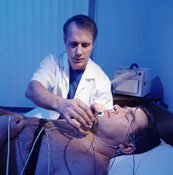 APSS: Associated Professional Sleep Societies Meeting Concludes war veterans prone to severe sleep disorders
APSS: Associated Professional Sleep Societies Meeting Concludes war veterans prone to severe sleep disorders
By Michael Smith, North American Correspondent, MedPage Today
BALTIMORE, June 10 — Veterans returning from the Iraq war can suffer sleep disturbances as severe as those among chronic insomniacs, researchers said here.
Combat vets reporting adjustment difficulties after they come home simply "do not sleep like good sleepers," said Anne Germain, Ph.D., of the University of Pittsburgh.
Both subjective reports of sleep disturbances and objective measurements in a sleep lab show a pattern that more closely resembles people with chronic insomnia, Dr. Germain and a colleague reported in two presentations at the Associated Professional Sleep Societies meeting.
Their findings arise from preliminary data from a study of combat vets that will eventually include 90 patients whose war experience comes mainly from the recent Middle East conflicts, Dr. Germain said…
Dr. Germain presented data from the sleep lab and Colleen Walsh, B.S., reported on how the vets themselves reported their sleep disturbances.
In the sleep lab, Dr. Germain said, she tested 11 medication-free veterans, of whom nine met full criteria for current moderate-to-severe posttraumatic stress disorder (PTSD).
She also tested 11 medication-free and healthy volunteers who were good sleepers, using Cohen’s d-values to assess group differences with small, medium, and large effect sizes indicated by d-values of 0.20, 0.50, and 0.80, respectively.
Analysis found that the vets:
Had lower sleep efficiency (d=0.81), related to moderate increases in sleep latency (d=0.35), duration and number of nocturnal awakenings (d=0.49 and d=0.62, respectively), and reduced total sleep time (d=0.34).
Sleep efficiency was significantly and negatively correlated with PTSD severity, at P<0.001. The sleep lab findings were paralleled by subjective measures in a group that included three more veterans, for a total of 14, according to Walsh.
Their subjective views were contrasted with 14 healthy volunteers who were good sleepers and 14 who were chronic insomniacs, Walsh said, using electronic sleep diaries and the Pittsburgh Sleep Quality Index (PSQI) questionnaire.
Disruptive nocturnal behaviors — such as kicking or screaming during sleep — were assessed using the PSQI addendum for PTSD, she said.
Analysis showed that — compared with the good sleepers — the veterans had significantly worse sleep quality and sleep efficiency, took longer to go to sleep, woke up more often after they fell asleep, and were awake longer when they did. The differences were all significant at P<0.001.
On the other hand, there were no significant differences between the veterans and the insomniacs, she said, except in disruptive nocturnal behaviors, where the difference was significant at P<0.001.
For example, Walsh said, veterans took an average of 32.5 minutes to fall asleep, compared with 8.6 minutes for the good sleepers and 42.1 minutes for the insomniacs.
The findings are not entirely surprising, said Jack Edinger, Ph.D., of the VA Medical Center and Duke University in Durham, N.C., who moderated the session at which Walsh presented her data.
"It has been a constant factor in every cohort of war veterans," said Dr. Edinger, who was not involved in the study.
"The change is there’s more focus on recognizing sleep disorders as the lynchpin in the experience of disturbances," he said. "If you can get these guys sleeping better, you can start to make some progress" with other co-morbid disorders.
He noted that sleep medicine is a relatively new discipline that can now be applied to recent vets.
The study was supported by the Department of Defense and the NIH.
Primary source: Associated Professional Sleep Societies meeting
Source reference:
Walsh CM, et al "Sleep quality and disturbances in returning veterans: preliminary comparisons with primary insomnia and good sleepers" APSS Meeting 2008; Abstract 697. Additional source: Associated Professional Sleep Societies meeting
Source reference:
Germain A, et al "Objective sleep disturbances in returning veterans with PTSD: preliminary findings" APSS Meeting 2008; Abstract 954.

"Go to Original" links are provided as a convenience to our readers and allow for verification of authenticity. However, as originating pages are often updated by their originating host sites, the versions posted on VT may not match the versions our readers view when clicking the "Go to Original" links.
The opinions expressed on VT are those of the authors and do not necessarily reflect those of the staff individually or as a whole.
(In accordance with Title 17 U.S.C. Section 107, this material is distributed without profit to those who have expressed a prior interest in receiving the included information for research and educational purposes. VT has no affiliation whatsoever with the originator of this article nor is VT endorsed or sponsored by the originator. Any opinions expressed by the author(s) are not necessarily those of VT or representative of any staff member at VT.)
ATTENTION READERS
We See The World From All Sides and Want YOU To Be Fully InformedIn fact, intentional disinformation is a disgraceful scourge in media today. So to assuage any possible errant incorrect information posted herein, we strongly encourage you to seek corroboration from other non-VT sources before forming an educated opinion.
About VT - Policies & Disclosures - Comment Policy



